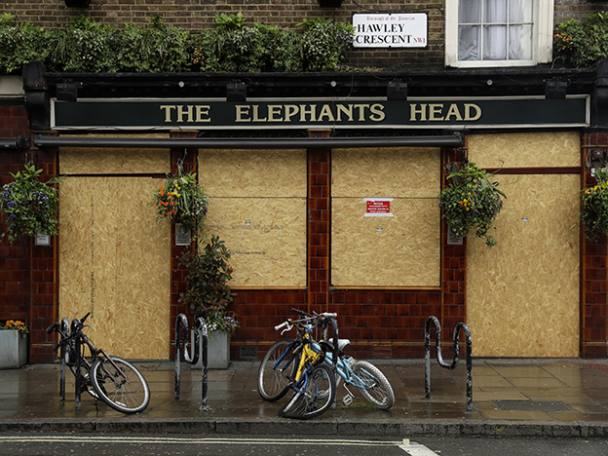British pub landlords are on the cusp of emerging from their government imposed lock-in, bleary-eyed and battered by months of minimal or no income. Pubs and bars, which all received their last orders from the government on 20 March, will be allowed to reopen on 4 July, although rumours have been circulating of a 22 June date. Patrons will probably be asked to keep two metres apart, although there has been clamour in the sector for one metre of social distancing instead.
The sector is a critical cog in the hospitality industry, and prior to the onset of coronavirus it looked as though it was reversing years of decline. Pubs employ around 895,000 people, according to the British Beer & Pub Association (BBPA). There were 39,130 pubs and bars in the UK last year, according to the Office for National Statistics, up from 38,815 in 2018 – representing the first increase since 2007. Market share estimates vary, but around 40 per cent of pubs are independent, per one analyst. Mitchells & Butlers (MAB), Marston’s (MARS) and JD Wetherspoon (JDW) are among the big listed players.
There has been confusion surrounding the return of the sector. In April, Wetherspoon said that it had started planning for a reopening of its pubs and hotels in June. It is now working towards 4 July, as this is the only date that the government has announced, a Wetherspoon spokesperson said, adding that the government has yet to confirm this date. On 7 June, the Financial Times reported that pubs could be allowed to reopen as soon as 22 June. The amount of social distancing required will also have a sizeable impact on the percentage of premises that will be able to reopen.
The BBPA has called for clarity on when beer gardens will be allowed to reopen, adding that all pubs must be allowed to open their doors on 4 July. “Our industry needs confirmed and definitive dates so we can get pubs ready for reopening,” says Emma McClarkin, BBPA chief executive. Safety measures need to be implemented, and time is needed to restock pubs with fresh draught beer. “This requires a minimum of three weeks, but ideally four weeks is needed,” she added.
Some pubs face a landlord fight
Pubs have been forced to endure weeks without income as a result of coronavirus. Young & Co (YNGA) only lost 10 days of trading in its most recent financial year, which ran to 30 March, but nevertheless lost £13m in revenue against total turnover of £312m. Like its peers, it has slashed capital expenditure and extended its credit lines as it seeks to control its leverage.
Young’s, whose estate is largely freehold, also claimed to be the first pub company to announce a three-month rent holiday for its tenants, effective from 16 March 2020. The crisis has exposed the vulnerability of certain pub groups who predominantly operate on a leasehold basis. On 25 March, the government banned landlords for three months from evicting commercial tenants who had been unable to pay their rent.
But this arrangement is close to expiring, and there are growing concerns within the pub sector that it will not be replaced, according to E&Y associate partner Andy Fyfe. “There’s a huge lobby in the industry to try and get a government-backed solution,” he says, “with a lot of the industry actually calling potentially for a nine- to 12-month rent moratorium.”
All of Revolution Bars’ (RBG) sites are leasehold, and the group has had “the full spectrum of conversations” with landlords, according to chief executive Rob Pitcher. While some landlords waived their March quarter rent, “initially, we had relatively aggressive landlords who were demanding full payment”, he said. “We are going to be in need of government assistance to either broker some sort of deal between landlords and tenants, or indeed actually come in with further financial support.”
“The government forced us to close,” he added. “We’ve had zero income for a period of what will likely be six months for some parts of hospitality, and zero income for us means that we cannot afford to pay the rent, and we can’t afford to defer the rent because the economic model doesn’t work that way.” Revolution Bars raised £15m via a share placing in early June.
Keep your distance
Pubs are preparing one-way systems, truncated menus and higher cleanliness standards in the bid to reopen. There are concerns in the industry over incidences of Legionnaires disease, as water cisterns have been left unused for some time. Pubs with gardens look most likely to open first and as things stand, pubs will be required to enforce two metres of social distancing when they reopen.
Young’s chief executive, Patrick Dardis, has argued that this measure will cause up to 1m more job losses in the industry. “There’s evidence that suggests that one metre is absolutely sufficient,” he says, adding that 70 per cent of pubs would be able to open with one metre of social distancing, compared with 30 per cent with two metres of distancing.
Young’s is currently something of an outlier in that it is preparing to open its pubs later than most, on 3 August, and is working towards opening with one metre of distancing, although the group says it will abide by government regulations. Wetherspoon, Revolution Bars and City Pub Group (CPC) are among those planning for two metres of distancing. If only pubs with gardens are able to open, Wetherspoon says that 80 per cent of its estate will be able to open its doors.
The difference in capacity when operating under one or two metres of distancing is stark, according to Ewen Macgregor, a partner at law firm TLT, who cites a recent study on restaurants. Taking a square box with capacity of 200 and two metres of distancing, the restaurant’s capacity would probably be just 25. With one metre, this goes up to 100.
He warned that pubs are legally vulnerable should they fail to maintain social distancing, both under coronavirus regulations and the licensing act. Nervous patrons are more likely to go to pubs with higher compliance standards, he adds. “It does present challenges, but equally if you get this right, it probably presents great opportunities for you.”
Pub menus will look different
There is also the matter of supplying pubs. Breweries have wound down some operations while pubs have closed, although the BBPA appears convinced that 4 July offers sufficient time to get fresh beer back into pubs. “I think customers want fresh [beer],” says City Pub Group chairman Clive Watson. Menus and drinks lists will be streamlined and partly influenced by the relative strengths of suppliers.
Some suppliers have stepped in to support clients. Carlsberg (Den:CARL-B) froze payments from March for customer costs including the renting of its draught dispense equipment and carbon dioxide bottles. The brewer will also credit full and unbroached kegs of Carlsberg UK product that go out of date to their trade accounts in full.
Budweiser’s UK breweries, which are part of drinks giant AB InBev (Bel:ABI), haven’t been producing kegs while pubs and bars have been closed, and expect the reopening to bring changes to demand. “The first few weeks, our pub and bar partners will have different product needs than they may have had pre-Covid,” said Ryan Fritsch, on-trade sales director at Budweiser Brewing Group UK&I.









